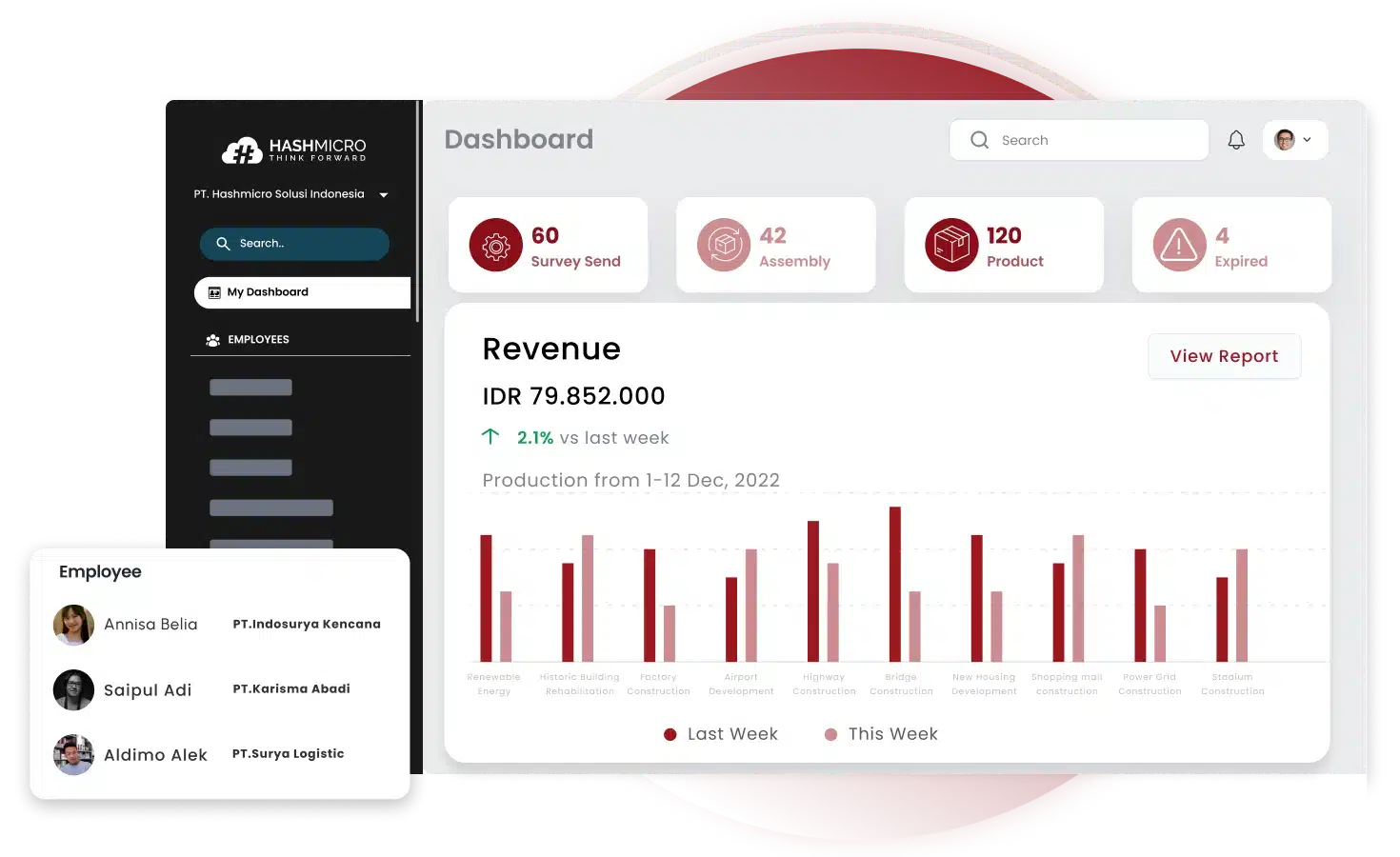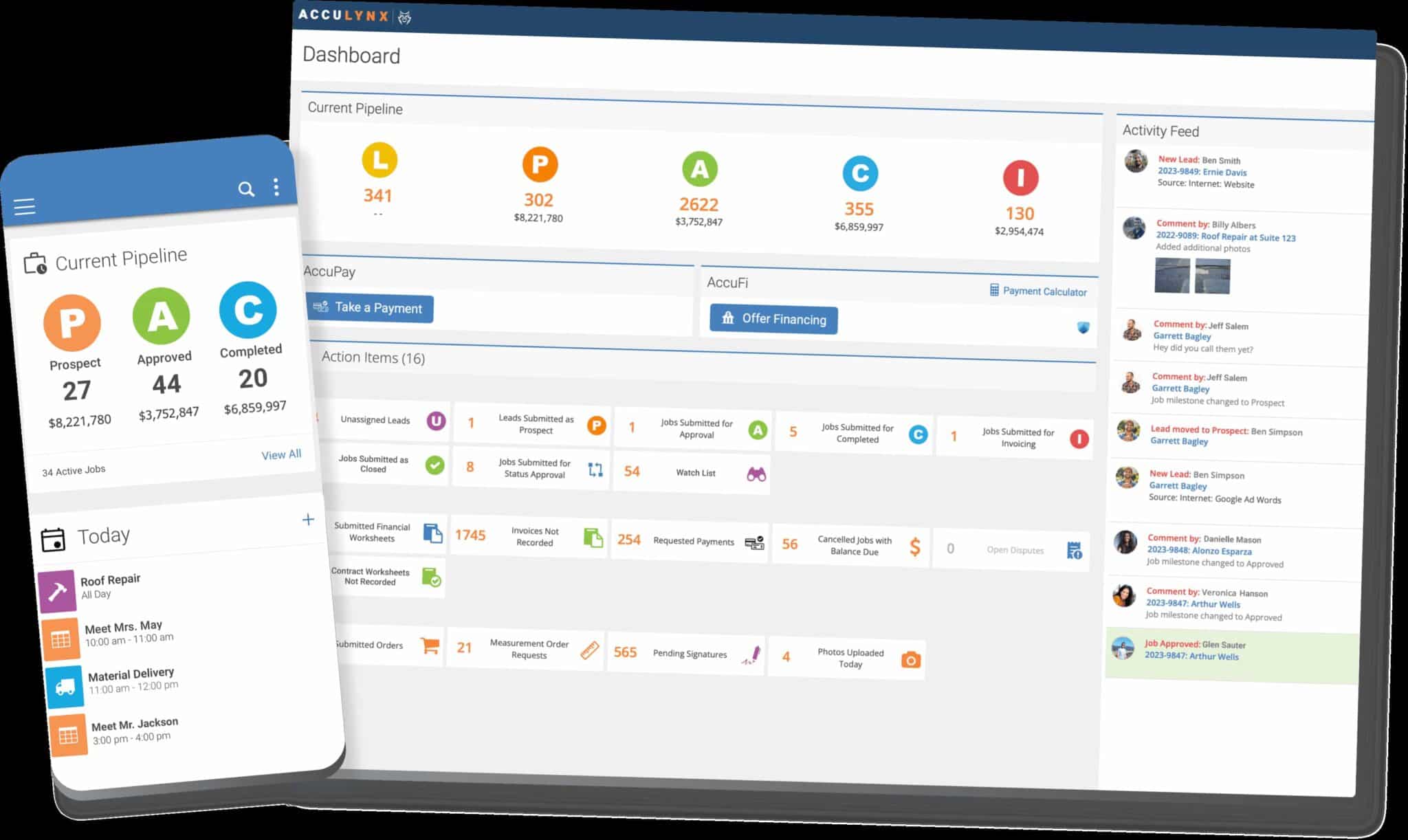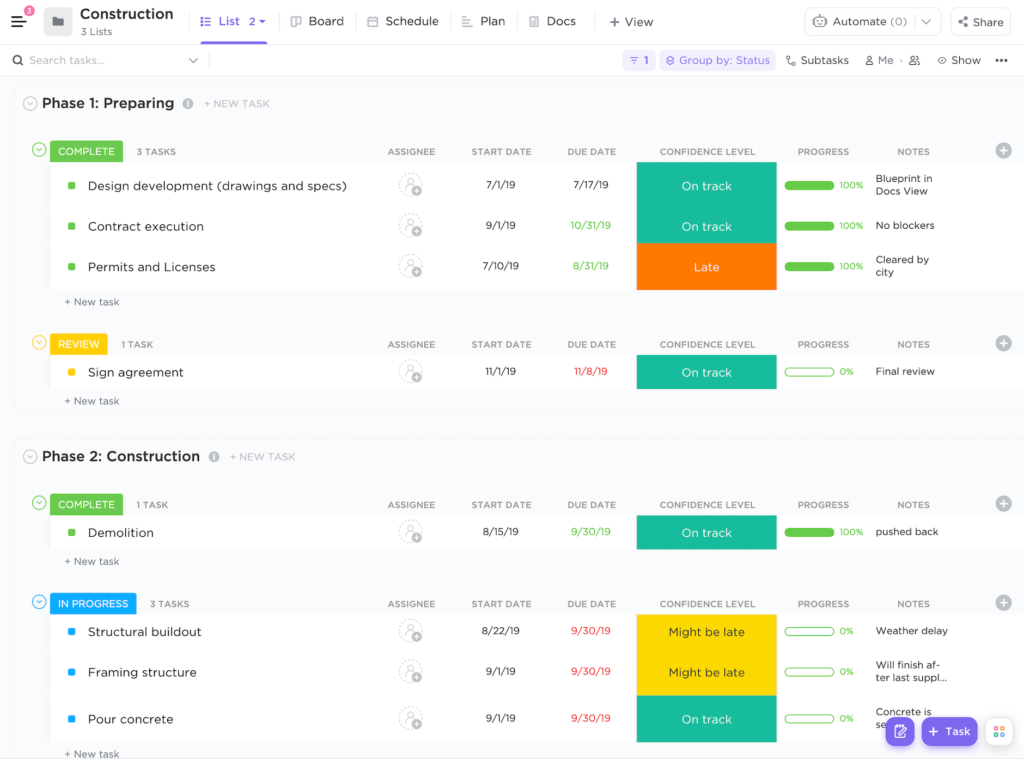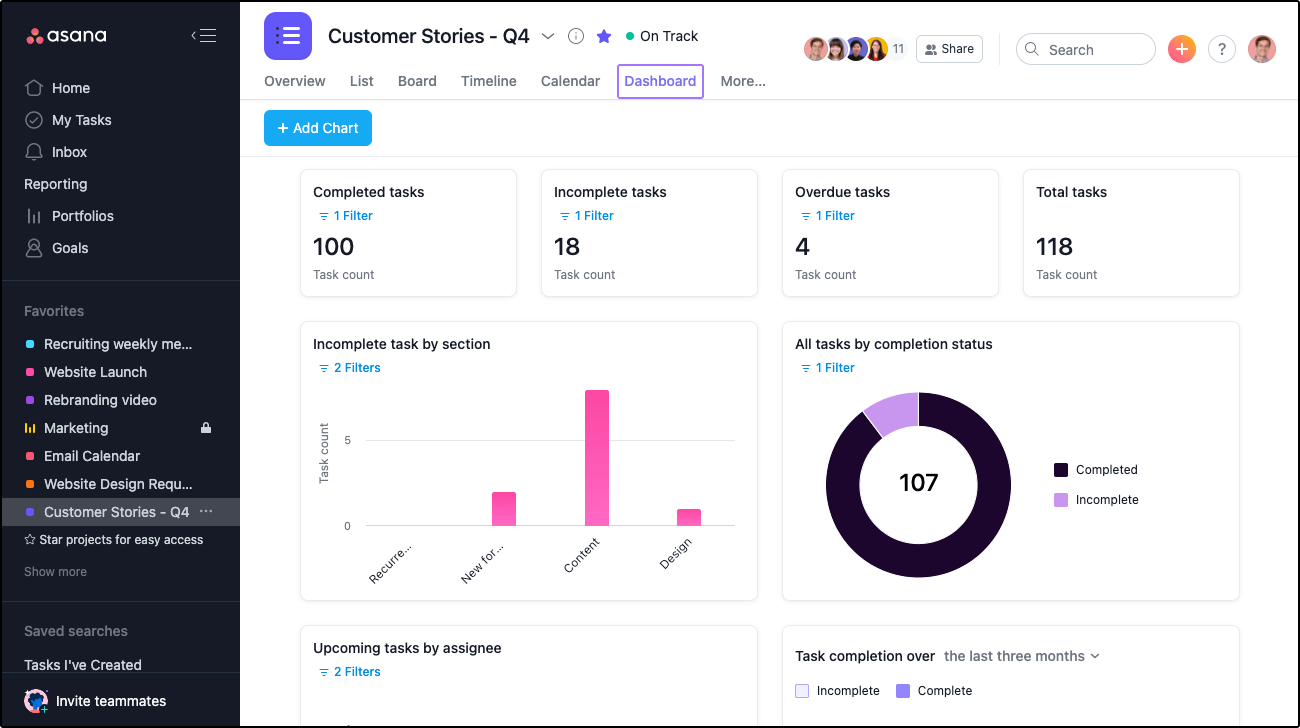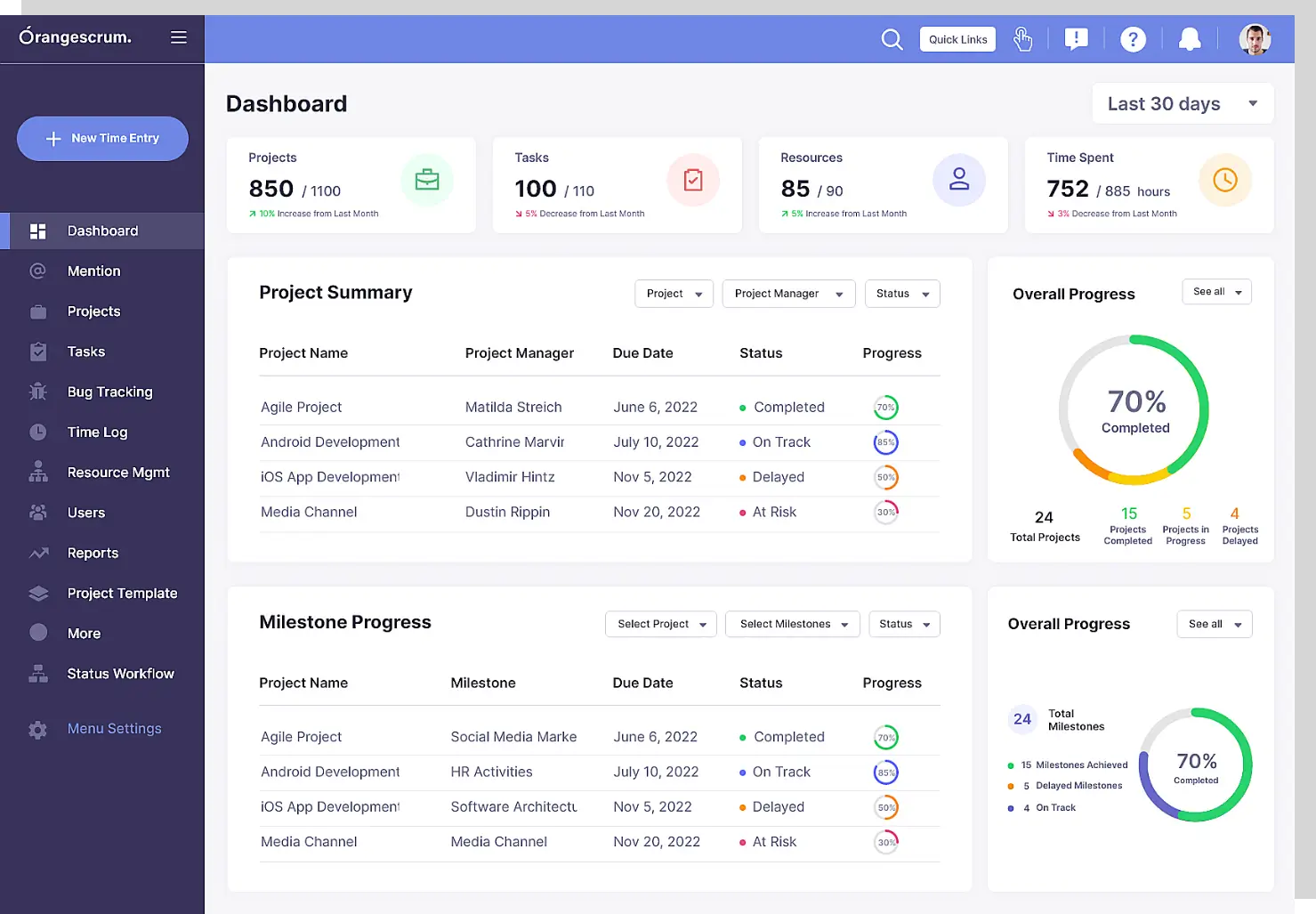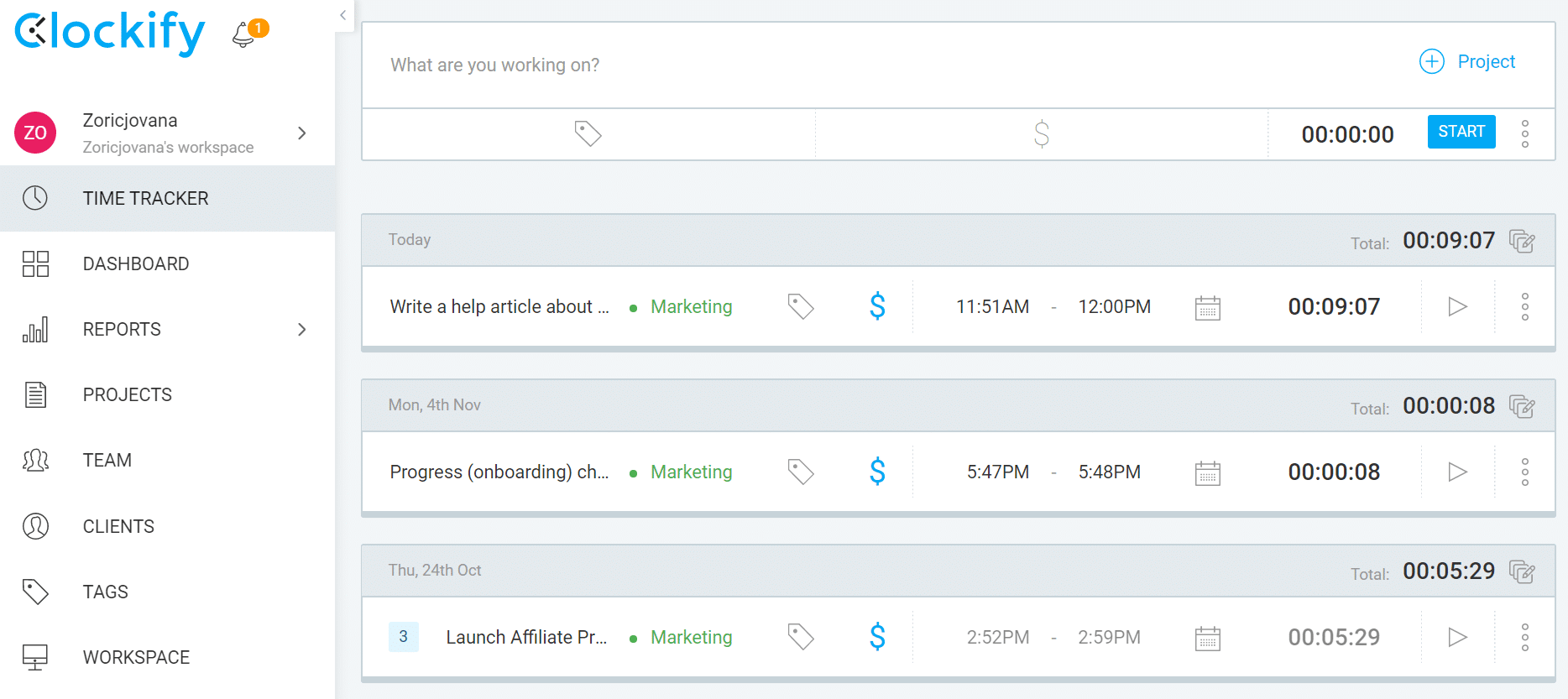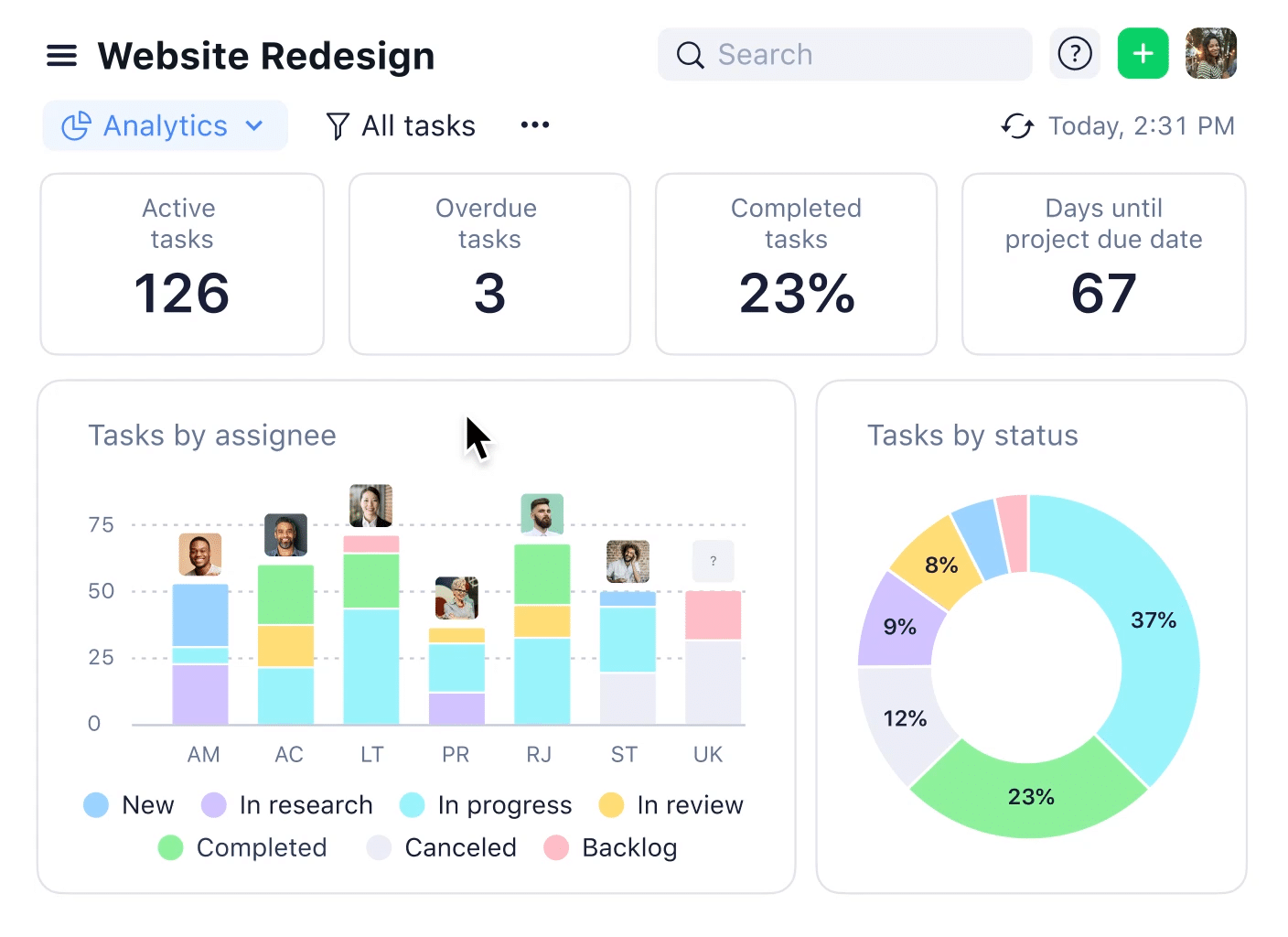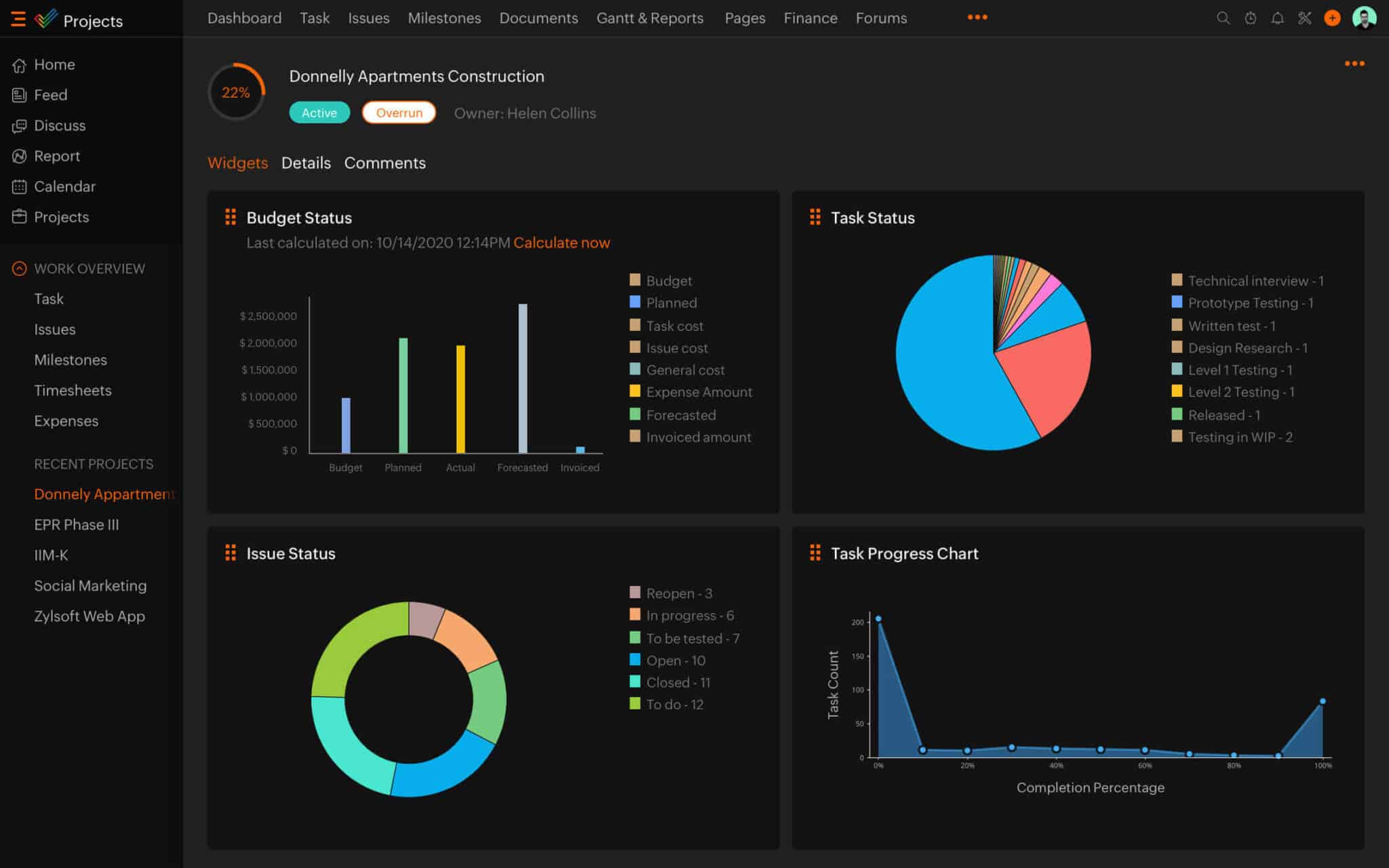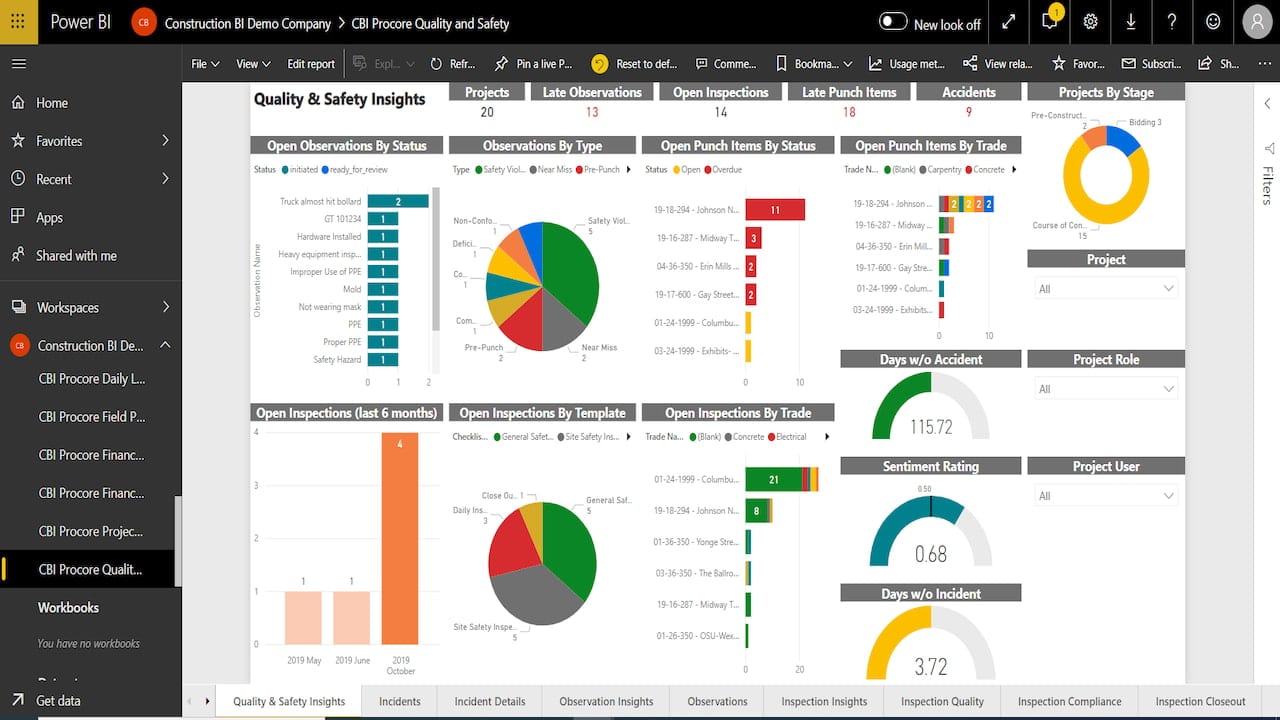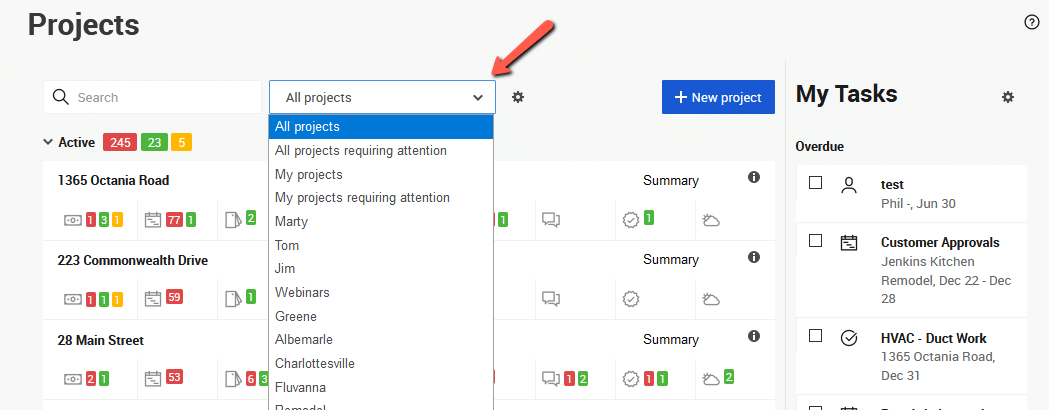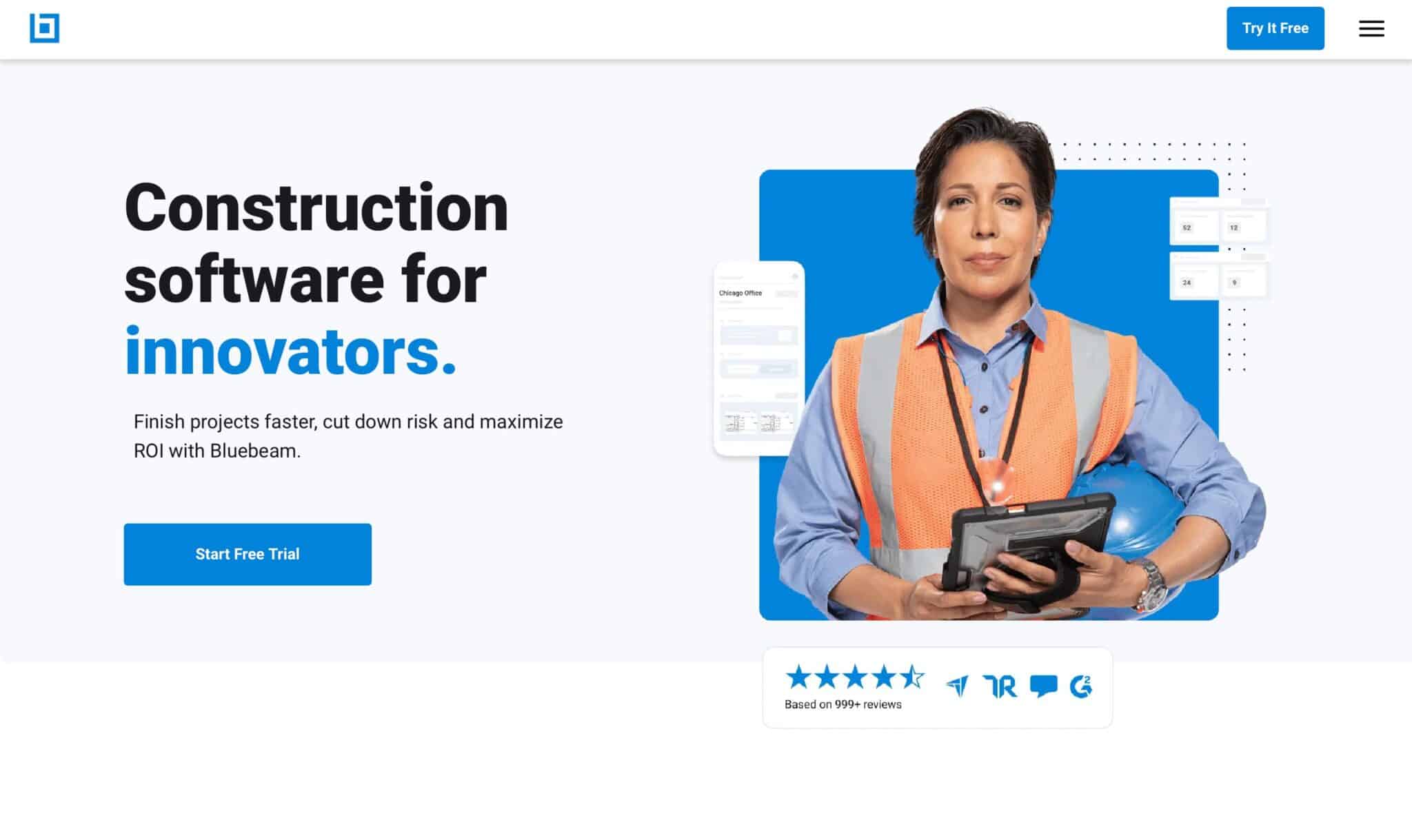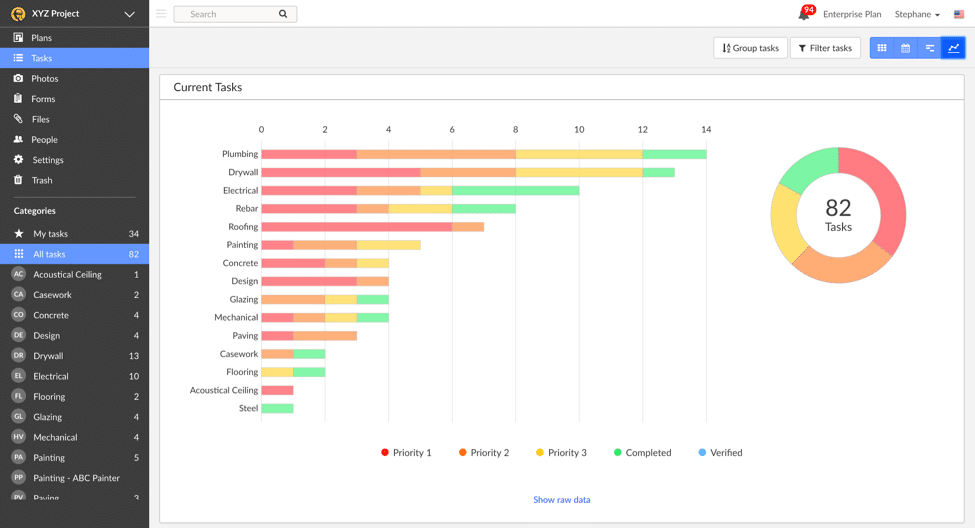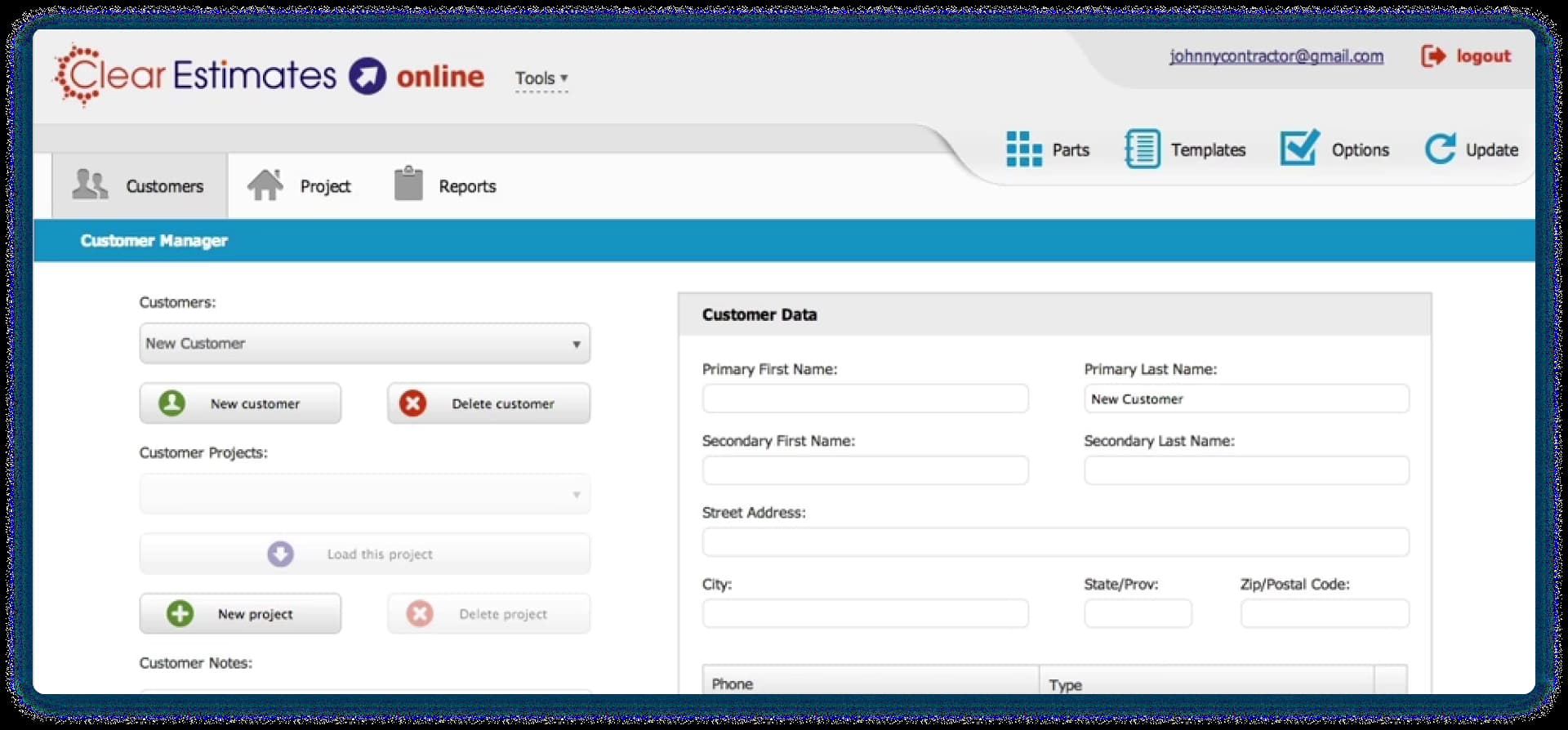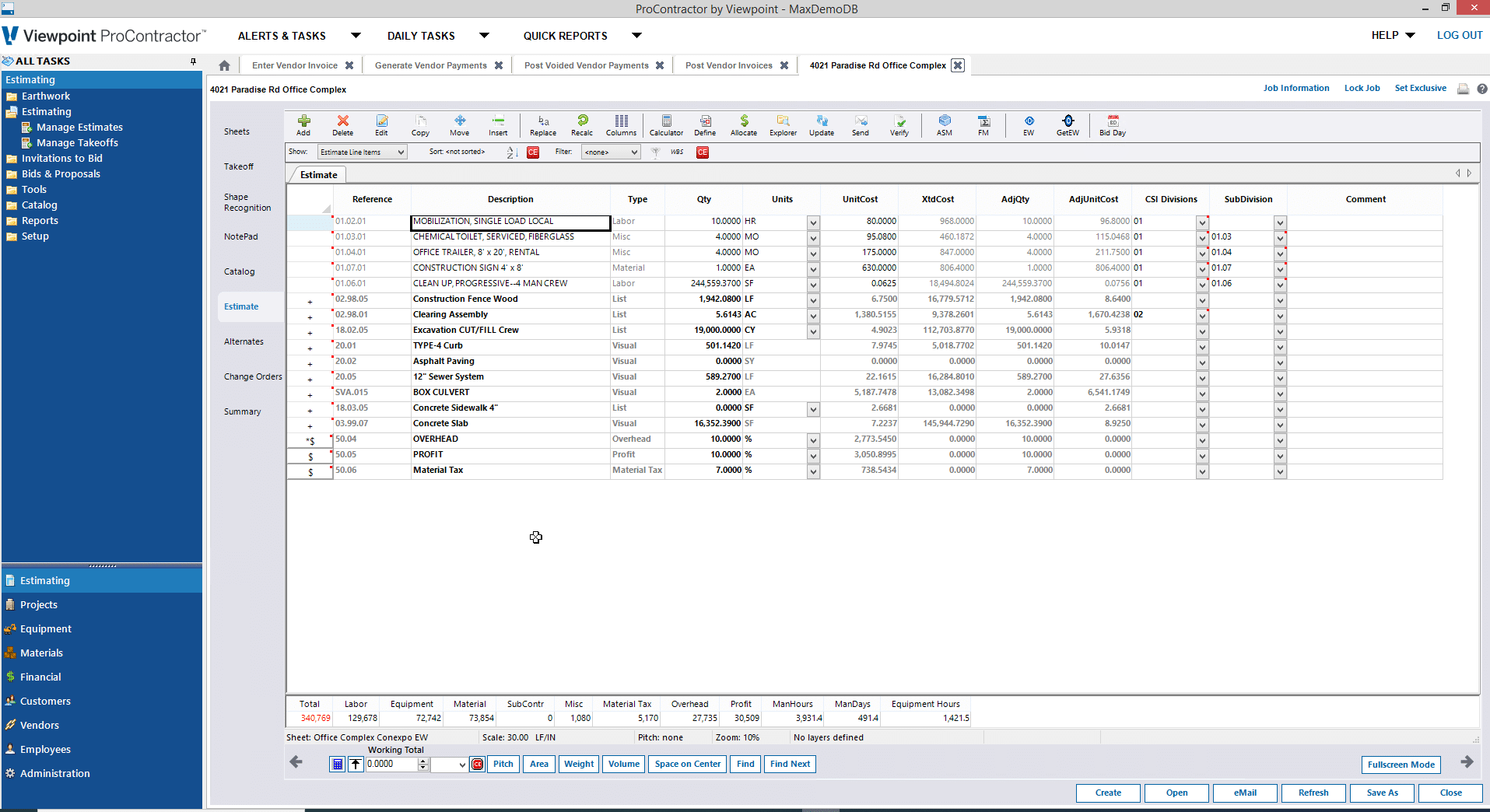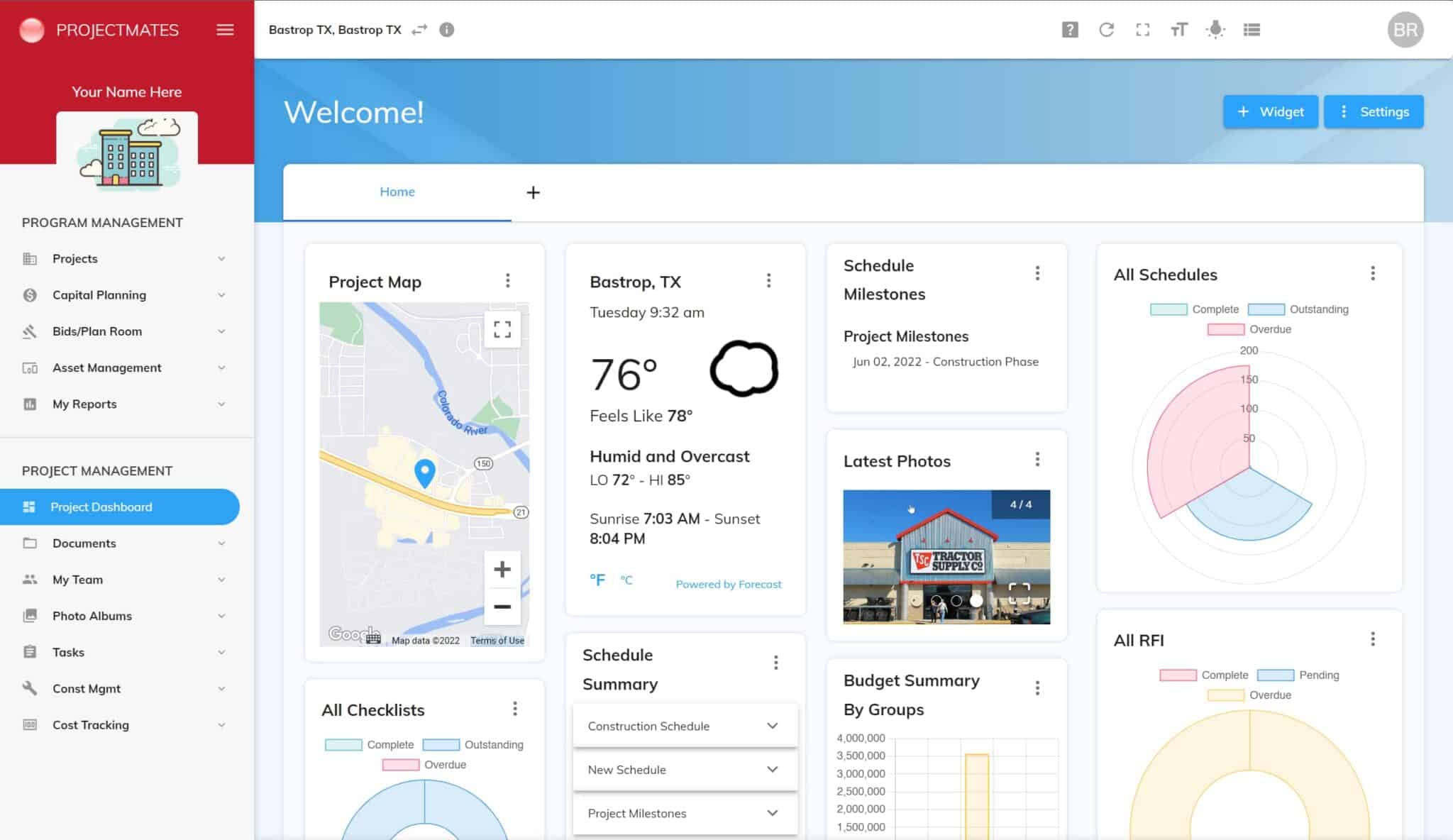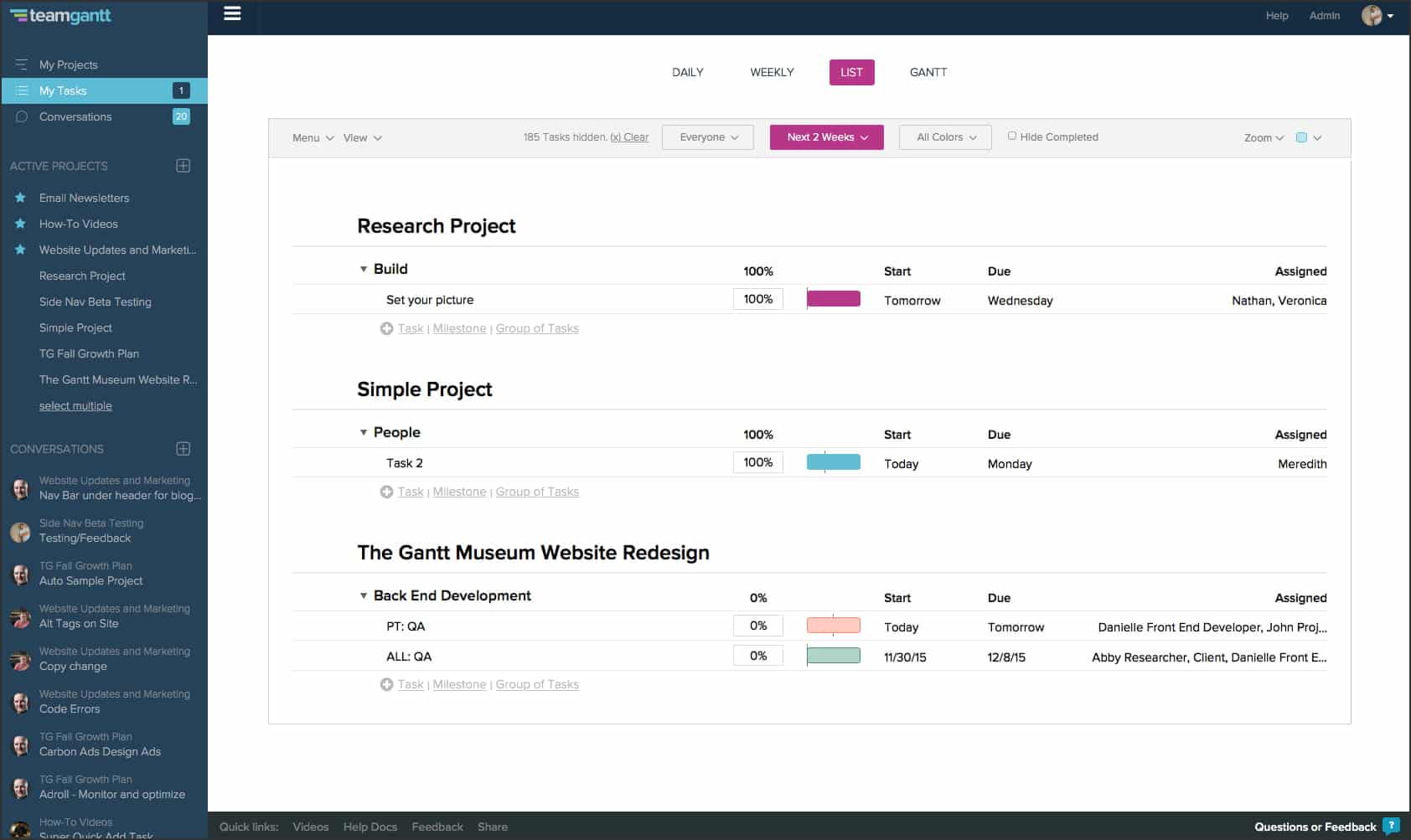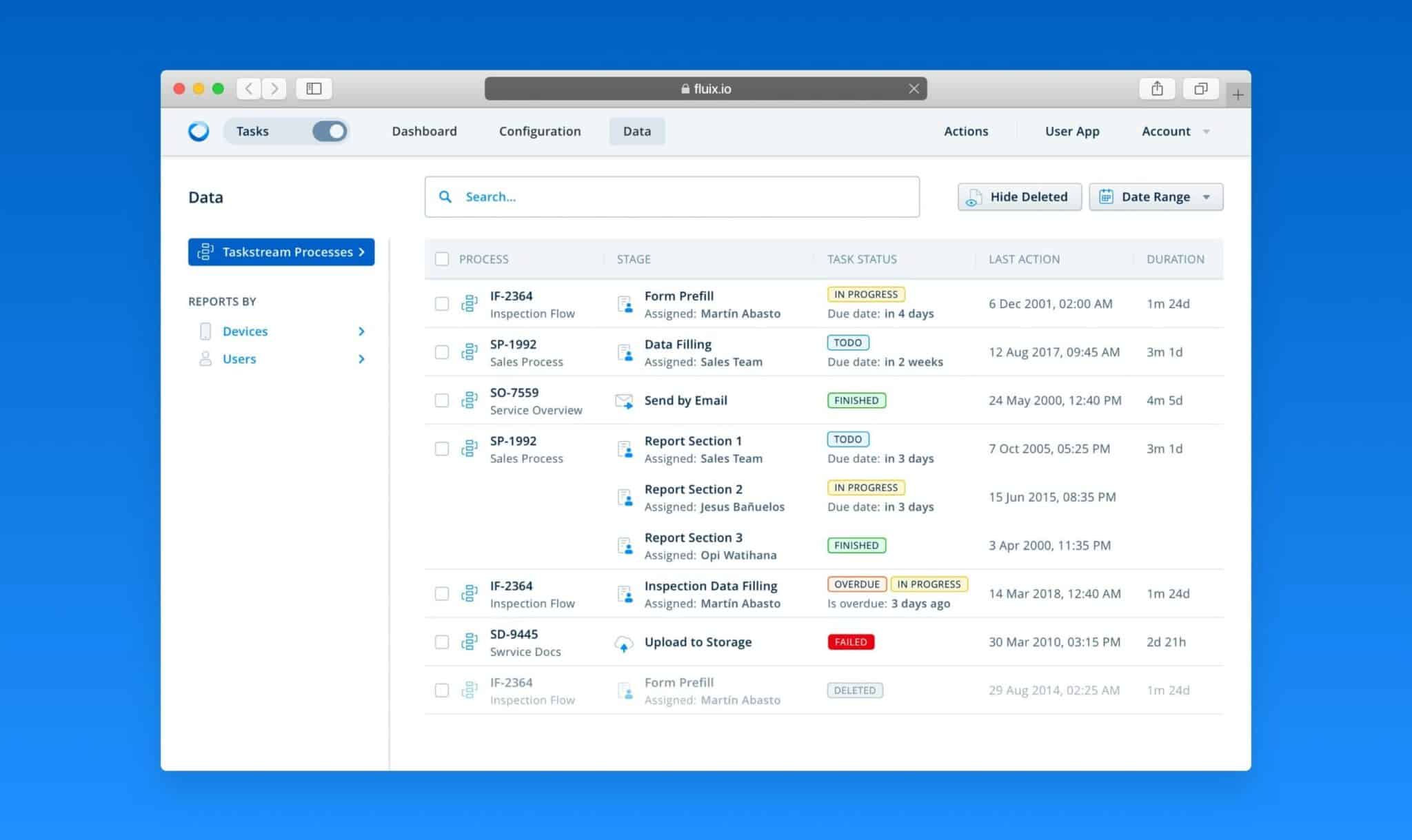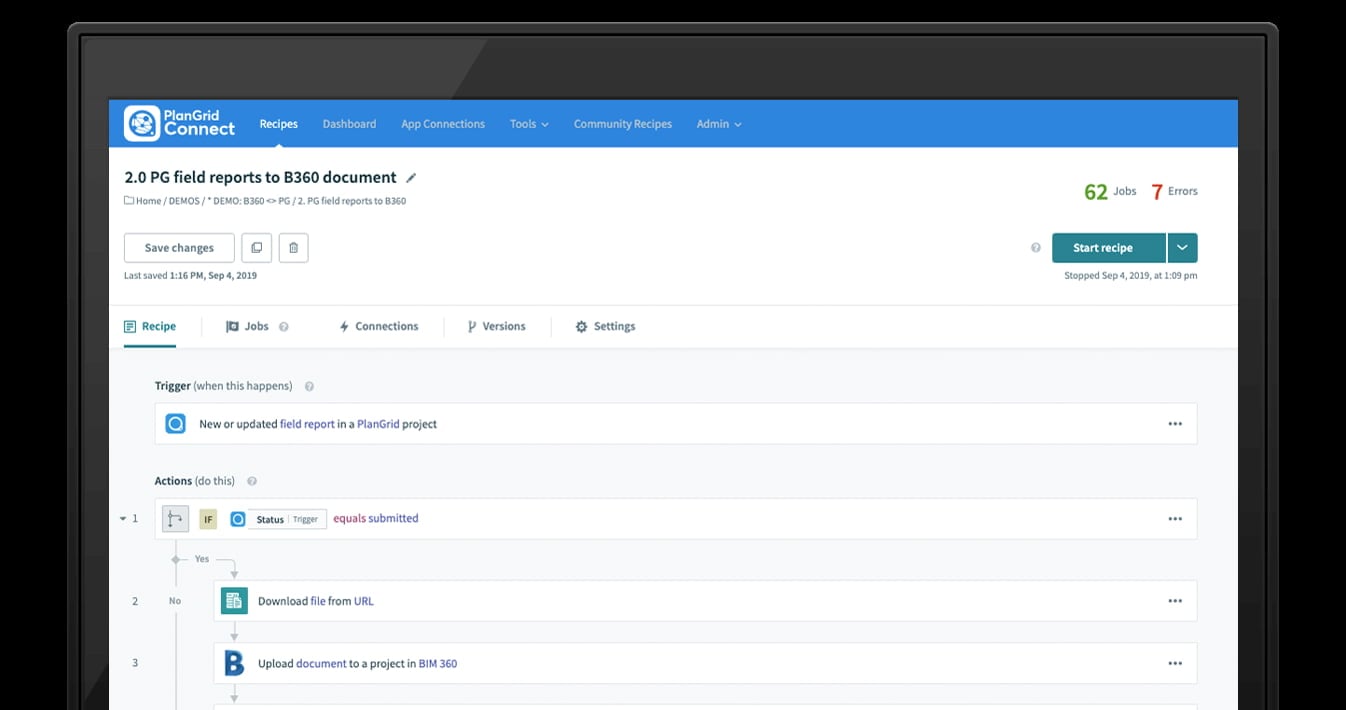Managing construction projects manually can lead to costly budget overruns due to unforeseen expenses and poor resource allocation. Businesses, particularly those managing multiple projects, require the use of the proper construction management software to prevent budget overruns.
One of the best software programs in Singapore is HashMicro’s Construction Management Software. HashMicro offers real-time budget monitoring, expense tracking, and risk management tools. Moreover, designed for main contractors, owners, and subcontractors, this tool is specifically tailored as a project management software for the construction industry.
HashMicro’s Construction Software is among the leading solutions in Singapore, offering advanced features such as real-time budget tracking, seamless project coordination, and enhanced reporting capabilities. Experience its full potential by requesting a free demo.
Key Takeaways
|
Construction Software Solutions Highlight
- HashMicro – Best overall for contractors, owners, and subcontractors with AI-powered project tracking and ERP integration.
- Acculnyx– Ideal for large-scale construction firms needing document control and mobile accessibility.
- ClickUp – Best for small-to-medium teams needing customizable project management tools.
- Asana – Great for businesses looking for affordable, cloud-based collaboration tools.
- OrangeScrum– Best for enterprise-level firms needing advanced analytics and resource management.
Table of Content:
Table of Content

What is Construction Management Software?

Construction project management software is essential for efficient project management. In addition, it offers features for budget calculation and human resource management. Therefore, ERP for Construction Management Singapore solutions streamline every aspect of your construction projects.
What to Look for in Construction Project Management Software?
A construction management software solution plays a pivotal role in enhancing the efficiency and success of your projects. To help you choose the best tool for your needs, we’ve created a thorough approach that looks at several important factors:
- Task Management: A system that enables you to assign tasks, track progress, and ensure deadlines are met efficiently.
- Scheduling: The software should support the organization of tasks, resources, and key milestones, allowing for effective planning.
- Document Management: A centralized hub for managing vital documents such as blueprints, lump sum contracts, and permits is essential for smooth operations.
- Budgeting and Cost Tracking: The ability to monitor expenses and maintain control over project costs is crucial for staying within budget.
- Collaboration and Communication Tools: The software should facilitate seamless communication and teamwork, ensuring smooth collaboration among all team members.
The first step is evaluating the software’s key features. The right construction management tool should cater to the distinct demands of construction projects.
20 Best Construction Management Software in Singapore
There are many options for the best construction software in Singapore. Here are some recommendations for the best construction software in Singapore that will improve your construction company.
1. HashMicro Construction Software
Best overall choice: HashMicro’s construction software is the best construction software for companies in Singapore. It offers a comprehensive and customizable solution that integrates project management, financial tracking, and real-time collaboration to ensure efficient and successful project completion.
First introduced in 2015, HashMicro offers the most comprehensive and affordable solution for construction using the best ERP software in Singapore. HashMicro has won the trust of and cooperates with various large companies, such as Danone, Forbes, and Bee Cho.
HashMicro’s contractor management software automates construction project operations and features AI-based enhancements for effective project management. It includes accounting, projects, HRM, contracts, tenders, fleet, etc.
HashMicro’s ERP construction software in Singapore also offers mobile app integration and full customization. It prioritizes user experience and ensures accessibility anywhere, anytime.
A standout feature of HashMicro’s construction software is its robust capability to monitor project activities.
This functionality offers unparalleled transparency and control over every aspect of construction projects. Project managers and teams can monitor all activities closely, ensuring tasks align with project timelines and objectives.
The system forecasts future budgets based on historical data, helping to plan finances, allocate resources efficiently, and make informed strategic decisions. This is essential for big enterprises to stay competitive, agile, and financially healthy in a dynamic business environment.
To support wider adoption in the construction industry, a CTC Grants offer is also available covering up to 70% of the cost, making the solution not only operationally effective but also financially accessible for companies looking to digitize their project management processes.
Additionally, this comprehensive project management tool aids in resource allocation, ensuring efficient use of manpower and materials. Its intuitive interface simplifies tracking, making it accessible for all team members, regardless of their technical expertise.
HashMicro Features:
- Budget S Curve Management
- In-depth Budgeting Type
- Stock Forecasting
- Variation Order on Subcontractor Contract
- Integrated with Asset Management
- Progressive Invoice and Bill
- Allocations Monitoring
- Approval Management
| Pros | Cons |
| ✓ Facilitates collaboration across large teams
✓ Unlimited user ✓ Operable without an internet connection ✓ User-friendly setup process ✓ Addresses a wide range of needs ✓ Offers in-depth data analysis ✓ Expert support available ✓ Easily accessible on mobile devices |
× Feature-rich design may overwhelm smaller operations
× Extended waiting period for accessing the free demonstration |
In addition, you can use HashMicro’s construction software pricing scheme to find its full features and price range.
2. Acculynx ERP Construction Singapore
Aside from HashMicro, Acculynx is building construction software that helps you see the construction business more clearly with better communication. This application can estimate the construction project thoroughly. The construction system from Acculynx gives you many conveniences, such as synchronization between divisions and easy access to data.
Suitable for: AccuLynx is designed for roofing contractors and specialty trade companies needing robust project management, CRM, and job scheduling features.
Acculynx Features:
-
- Project scheduling
- Project management
- Accounting and CRM integration
| Pros | Cons |
| ✓ Facilitates project planning with an interactive platform
✓ Quick tracking of feedback with annotation tools |
× Absence of built-in time management features |
3. ClickUp Construction Project Management Software
ClickUp is construction software that enhances productivity and manages construction projects. It is favored by efficient teams across businesses of varying sizes. ClickUp provides an expansive suite of features that include limitless tasks and many other exceptional functionalities at no cost.
Moreover, ClickUp does not restrict the array of project management tools available to its users, ensuring a comprehensive solution for any construction project need.
Suitable for: ClickUp is suitable for construction companies of all sizes looking for a versatile project management tool that can handle various tasks and workflows.
ClickUp Features:
-
- Mobile apps
- Templates
- Offline mode
- Map view
| Pros | Cons |
| ✓ Free version available
✓ Visualize the construction project ✓ Project management dashboard ✓ Global time tracker |
× No 24/7 support
× Limited integration × Chance to slow or error
|
4. Asana Project Management Construction Software

Asana is a project management application tailor-made to assist teams within the construction sector in achieving a comprehensive view of their tasks, thus simplifying the completion process.
This tool is instrumental in helping teams visualize the broader scope of their projects, which is essential for efficient task management in the dynamic environment of construction projects.
However, it’s worth noting that Asana lacks a dedicated mind mapping feature, which raises some questions about how much your team can visualize the “big picture” of your projects.
This absence might limit the ability to fully explore and understand complex project relationships and dependencies in a visual format, which can be a crucial aspect of managing large-scale construction projects.
Suitable for: Asana is ideal for small to medium-sized construction firms that need a user-friendly platform to manage projects, track progress, and collaborate effectively.
Asana Features:
- Calendar view
- Custom project template
- Agile project management
- Interactive dashboard
| Pros | Cons |
| ✓ Digital project planning dashboard
✓ Free plan available ✓ Feedback and comment tracking |
× No collaborative document editing
× Time tracking feature unavailable × Not suitable for small or simple project |
5. OrangeScrum Project Management System
OrangeScrum is a construction ERP software in Singapore that operates on an open-source model, designed to assist teams in effectively allocating resources, managing time, and facilitating collaboration. The software is equipped with time-tracking capabilities and timesheets, enhancing its utility for meticulous time management.
However, those looking to leverage the full potential of OrangeScrum’s project management capabilities, particularly under the free plan, might need to purchase additional add-ons. These add-ons are crucial for accessing vital functionalities such as document management and specialized construction project templates.
Suitable for: Orangescrum is perfect for construction businesses that require customizable project management solutions with robust collaboration features.
OrangeScrum Features:
- Time tracking and timesheets
- Schedule management
- User-friendly interface
- Construction project template
| Pros | Cons |
| ✓ Free plan available
✓ Custom task status ✓ Collaborative document |
× Unlimited user
× Many add-ons cost× Lack integration |
6. Clockify
Clockify stands out as a widely used construction management system. It offers a no-cost solution for construction teams to monitor work hours across different projects. Its user-friendly interface is complemented by various useful functionalities, although adding an integrated chat feature could further enhance its utility.
With this construction project management software, users can record time using a timer or manually enter their hours into a timesheet. The software is designed to automatically tally billable hours by applying your specified hourly rates to the tracked time, simplifying the invoicing process.
Suitable for: Clockify is best suited for construction companies focused on precise time tracking and productivity monitoring to manage labor costs efficiently.
Clockify Features:
- Time tracker
- Detailed reports and analytics
- Location tracking
| Pros | Cons |
| ✓ Unlimited user and projects
✓ Integration available ✓ Privacy guarantee |
× No collaborative features
× Lack of a mobile app
|
7. Wrike Construction Management Software
Wrike stands out in the construction software arena with an innovative feature known as work intelligence, designed to identify potential risks within your projects proactively.
Wrike offers a suite of key functionalities, including precise time tracking and robust documentation and resource tracking capabilities, ensuring you can easily find the materials and information you need.
Suitable for: Wrike construction ERP software Singapore is designed for large construction enterprises needing comprehensive project management with advanced reporting and resource allocation capabilities.
Wrike Features:
- Document and resource tracker
- Customizable dashboard
- Collaborative worksheet
| Pros | Cons |
| ✓ Intuitive dashboard
✓ Good integration with third-party apps ✓ Free plan and storage |
× Limited features
× Lack of data organization × Frequent errors |
8. Zoho Project Management Software
Zoho Projects is a cloud-based project management platform tailored to the needs of small—to midsize construction businesses. It provides them with the tools necessary to streamline their operations.
The software includes a range of integrations and add-ons, enhancing its functionality and adaptability to various workflows. It also features a mobile application compatible with iOS and Android devices, ensuring project management on the go.
Suitable for: Zoho Projects is suitable for small to mid-sized construction companies that need an integrated project management tool with CRM and financial modules.
Zoho Project Features:
- Comprehensive integration
- Mobile apps
- Time tracker
- Invoice and bill management
| Pros | Cons |
| ✓ Affordable cost
✓ Simple dashboard ✓ Time-tracking capabilities |
× Complicated resource management view
× Limited features and usage of free plan |
9. Procore Construction Software
One provider of cloud-based project management for construction in Singapore is Procore. Procore is a construction project management solution that connects you with field teams, administrators, and others on a single platform. Construction software from Procore can help you manage construction projects, human resources, and company finances.
In addition, this software has a centralized system that allows you to handle project details, schedule tasks, and view the progress of construction projects. Construction software from Procore is perfect for property developers, project managers, contractors, and architects in the construction industry.
In addition, this system is already integrated with the mobile app. This convenience allows you to access complete information related to construction projects quickly and accurately. Project management software from Procore for your construction business starts at $375 monthly.
Suitable for: Procore is ideal for large construction firms and enterprises that require an all-in-one construction management platform with extensive features for project coordination, documentation, and communication.
Procore Features:
- Project tracking
- Optical Character Recognition (OCR) Technology
- Mobile access available
| Pros | Cons |
| ✓ All-encompassing solution for various tasks
✓ Efficient and accurate report-generation capabilities |
× High ongoing financial commitment |
10. CoConstruct Management Construction Software
The next integrated construction project management software you need to know is CoConstruct. This app assists you in managing projects, finances, and clients in your construction business. This integration can allow you to synchronize all operational data of construction projects online more efficiently.
The cost of this construction software starts at $99/month, while the full-packaged version costs $299 – $499 per month. Some of the features of CoConstruct’s construction software include pre-construction prospects, CRM, timesheets, warranty, tracking project progress, etc.
Suitable for: CoConstruct is perfect for custom home builders and remodelers who need a specialized tool for managing projects, clients, and contractors seamlessly.
CoConstruct Features:
- Reporting and analytics
- Project tracker
- Customizable project templates
| Pros | Cons |
| ✓ Efficiently monitors projects and client interactions
✓ Streamlines financial transactions ✓ Offers flexibility to tailor documents and processes |
× The mobile application lacks some functionalities or usability
× Some users may find the software challenging to master initially. |
11. Bluebeam Construction Management System
If you’re looking for a construction ERP in Singapore that can streamline project workflows while improving team collaboration in real time, Bluebeam is the solution. Bluebeam’s construction management software is innovative and can save your construction time and costs.
Bluebeam is perfect for design and construction professionals who must streamline construction project planning. The application is also compatible with the iPad, making it easier to design construction projects more efficiently.
Suitable for: Bluebeam is best suited for construction companies that need advanced document management and collaboration tools for design, engineering, and construction projects.
BlueBeam Features:
- Document and image management
- Design reviews
- Project handovers
| Pros | Cons |
| ✓ Streamlines the process of converting drawings to PDF format
✓ Facilitates efficient teamwork and communication through mark-up tools |
× Challenges in receiving adequate customer support
× Difficulties in obtaining effective technical assistance × Issues encountered during software updates and upgrades. |
12. Fieldwire Construction Software
One of the construction software that is ready to help construction professionals proactively is Fieldwire. This application makes it easier for you to plan and manage construction projects more efficiently. In addition, Fieldwire’s construction system can connect the information to workers across divisions to make it more effective and efficient.
You can also access your construction data whenever and wherever you need it. Fieldwire offers a free option for the basic tier with a five-user limit for its pricing. As for growing businesses, you can choose the pro version for $29 per user per month and the business version for $49 per user per month.
Suitable for: Fieldwire is ideal for field teams in construction companies looking for a mobile-first solution to coordinate tasks, plans, and punch lists on-site.
Fieldwire Features:
- Plan management
- Document storage
- Progress reports
- Timesheets
| Pros | Cons |
| ✓ Enables monitoring of project progress and individual task completion
✓ View drawings and details on both iOS and Android devices |
× Only one user can be designated as the assignee, others are mere watchers
× Restricts to a maximum of five users and excludes custom status options × Does not integrate with Slack, Microsoft Outlook, or Google Calendar |
13. Clear Estimates
One of the best contractor management software in Singapore is Clear Estimates. This application is unique because it can help you make project estimates, generate offers, manage customers, etc. This construction software is perfect for remodelers and contractors.
The system is also cloud-based and focuses on estimating costs in minutes. New users can try this construction application’s working system for 30 days free of charge. However, it will cost $59 per user per month.
Suitable for: Clear Estimates is perfect for small construction companies and contractors who need a straightforward tool for creating detailed and accurate project estimates.
Clear Estimates Features:
- Proposal templates
- Cost estimate reports
| Pros | Cons |
| ✓ Compatible with over 80 apps and available on all operating systems
✓ Enhances privacy and security through a self-hosted version |
× Missing an integrated chat function for communication
× The mobile version is not as comprehensive as the web and desktop applications |
14. ProContractor
ProContractor is one of the best construction software in Singapore. This cloud-based solution can help you manage the complexity of a construction project’s entire operational cycle.
Some of the benefits of this construction system are increasing business visibility, improving report accuracy, and controlling costs and schedules.
In addition, ProContractor project construction management is perfect for small and medium-sized businesses. This contractor management software allows you to estimate time efficiently through collaboration and integration.
Suitable for: ProContractor is suitable for construction businesses that require a comprehensive solution combining project management, accounting, and estimating capabilities.
ProContractor Features:
- Project tracking
- Document management
- Scheduling
| Pros | Cons |
| ✓ Unified system for various functionalities
✓ Offers immediate understanding of the financial status of projects and portfolio |
× Needs more adaptability in tool configurations
× Some users may find the software challenging to master initially |
15. Projectmates
Projectmates is a cloud-based building construction software that can improve the security of your construction business data. The app is straightforward so that you can manage your overall project in one centralized system.
In addition, you can access company data in real-time whenever you need it. Another advantage is the ease of system configuration, which allows you to customize the construction software according to your company’s unique needs.
Suitable for: Projectmates is ideal for construction companies and owners managing multiple projects simultaneously, providing extensive project tracking and reporting features.
Projectmates Features:
- Contract management
- Capital planning
- Timesheet and reporting
- Document management
| Pros | Cons |
| ✓ Includes sub-schedules and variables for detailed estimates
✓ Ability to invite others to projects via a shareable link |
× Restricted to a single user on the free version |
16. TeamGantt
TeamGantt is an building construction software in Singapore that is specifically designed to facilitate the management of construction projects. It offers a user-friendly interface and tools tailored to this industry.
The software is renowned for its intuitive drag-and-drop feature, which allows for the effortless reordering of tasks and adjustment of timelines. This makes project planning and rescheduling simpler and more flexible.
Suitable for: TeamGantt is perfect for small—to medium-sized construction firms that need an intuitive, visually oriented project scheduling and management tool.
TeamGantt Features:
- Reorder tasks
- Portfolio view
- Calendar and scheduling
| Pros | Cons |
| ✓ Live chat assistance
✓ Mobile app available ✓ Collaborative features |
× Expensive for big project
× No budget management |
17. Fluix Building Construction Software
Fluix is a no-code construction management platform that enables users to streamline their workflow management with ease. This tool is particularly beneficial for those looking to quickly implement workflow management without the complexities of enterprise software.
At the core of Fluix’s offerings are advanced automated workflows and tasks, digitized documents and forms, and eSignature software, which allows for the instant capture of electronic signatures. This software is particularly useful for iPhone and iPad users.
Additionally, the platform provides offline access, ensuring work continuity even in areas with limited internet connectivity.
Suitable for: Fluix construction management system is best suited for construction companies focused on streamlining document workflows and improving field data collection with mobile forms and inspections.
Fluix Features:
- Automated workflows
- Online and offline access
- eSignature
| Pros | Cons |
| ✓ Easy to use
✓ Comprehensive workflow ✓ Cloud storage available ✓ Integration with other apps |
× Limited features
× Lack of support |
18. Methvin
Methvin is project management and building construction software designed to streamline the preparation phase for construction teams and propel them efficiently toward project commencement.
Despite its robust features, it’s important to note that the software’s free version is restricted to a single user, which may limit collaborative opportunities for larger teams.
Methvin stands out with its ability to securely store important project documents and drawings, making it a comprehensive management tool for construction projects. It also offers a client portal, facilitating easy information submission by both general contractors and subcontractors.
Suitable for: Methvin construction management software is ideal for construction companies that need a cost-effective solution for project estimation, tendering, and scheduling with collaborative features.
Methvin Features:
- Document management
- Email integration
- Client portal
| Pros | Cons |
| ✓ Collaborative features
✓ Comprehensive reporting tools ✓ Free plan available |
× Unlimited user
× No mobile apps |
19. PlanGrid
PlanGrid is recognized as a comprehensive construction ERP in Singapore, which is an integral field project and cost management resource for builders. It enables seamless sharing of plans, markups, photos, reports, and other crucial project information among all participants involved in a construction project.
Central to PlanGrid’s utility are its capabilities for handling 3D models and sheets, facilitating a multi-dimensional view of construction plans. The software also allows for the customization of photo tags, enhancing the organization and retrieval of visual data.
Suitable for: PlanGrid project management software for construction industry looking for an easy-to-use mobile app to manage blueprints, documents, and project tasks in real-time.
PlanGird Features:
- 3D sheets model
- File and document management
- Quality maintain
| Pros | Cons |
| ✓ Online and offline access
✓ Easy to use |
× Limited features |
20. JobProgress Construction Software
JobProgress is a cloud-based construction project management software solution in Singapore. This system simplifies the operations of housing renovation contractors. Construction software from JobProgress is perfect for small businesses.
You can easily customize this system according to the company’s needs. This construction management software lets you control and manage your construction business whenever and wherever you are. That way, you can track, monitor, or measure the progress of your construction projects efficiently.
Suitable for: JobProgress is perfect for small to mid-sized construction contractors who need a comprehensive tool for job management, CRM, and workflow automation.
JobProgress Features:
- Customized job & workflow manager
- Paperless mobile app
- Online sales and marketing
| Pros | Cons |
| ✓ Adaptable to specific business needs
✓ Designed to meet the requirements of smaller enterprises ✓ Accessible via mobile devices for on-the-go management |
× Restrictions on the number of users
× Relatively expensive initial investment × Additional expenses for upkeep and updates. |
How to Choose The Best Construction Project Management Software
Choosing the right construction ERP software in Singapore is essential for successful project execution. In addition, the ideal software should streamline project management, improve communication, optimize resource allocation, and foster collaboration.
Here’s a Guide to Help You Select the Best Construction Project Management Software for Your Needs:
- Assess Your Needs: Start by evaluating the size of your business, the complexity of your projects, and the number of team members involved. This will help you identify the essential features required, such as task scheduling, budget management, document control, and real-time communication.
- Look for Integration Capabilities: The software should integrate seamlessly with your existing tools like accounting software and CRM platforms. This prevents data silos and ensures an efficient workflow. Construction ERP software in Singapore is known for its strong integration capabilities.
- Evaluate User Interface and Usability: A user-friendly interface is essential for quick adoption and minimal training. The software should be intuitive, easy to navigate, and accessible to all team members regardless of their tech savvy. A good construction management system will offer a simple yet effective user interface.
- Consider Mobile Accessibility: Mobility is crucial in the construction industry. Choose software with mobile apps or mobile-friendly web interfaces for easy access and collaboration. Construction ERP software in Singapore often includes strong mobile functionalities.
- Check for Customization and Scalability: The software should be flexible enough to adapt to your evolving business needs. Look for options that allow customization and can scale as your projects or business grows. A customizable construction management system can grow with your business.
- Analyze the Reporting and Analytics Features: Effective software should offer reporting and analytics to track progress and budgets. This enables data-driven decisions based on real-time insights. Construction ERP software in Singapore provides advanced reporting tools.
- Understand the Support and Training Offered: Assess the level of customer support and training provided by the software vendor. Reliable support and comprehensive training are essential for troubleshooting and ensuring that your team can leverage the software to its fullest potential.
- Review Security and Compliance Standards: Ensure that the software adheres to industry standards and regulations. Data security and privacy should be a top priority, particularly when handling sensitive project information. Construction ERP software Singapore typically complies with high security standards.
- Read Reviews and Request Demos: Before making a final decision, read reviews from other users in the construction industry. Request demos or trial periods to test the software in real-world scenarios. This step can provide valuable insights into the software’s performance and suitability for your projects.
- Consider Cost vs. Value: Finally, weigh the cost of the software against the value it brings to your business. While it’s important to adhere to your budget, investing in a slightly more expensive option that meets all your requirements could be more beneficial in the long run.
Conclusion
A construction project involves a series of activities aimed at achieving a goal, such as buildings or infrastructure, within specific time, cost, and quality constraints. Therefore, the success of the project depends on two key stages: thorough monitoring and dynamic evaluation.
One of complete ERP software Singapore in construction industry is Hash Construction Software from HashMicro. HashMicro’s construction software provides various features to optimize your construction project’s monitoring and evaluation process.
You can maximize the efficiency of your construction projects through automated monitoring on the fly. Now, you don’t need to do manual monitoring and evaluation, which takes a lot of time and effort with the number #1 contractor management software in Singapore. Switch to HashMicro now for the best deals and free demos!
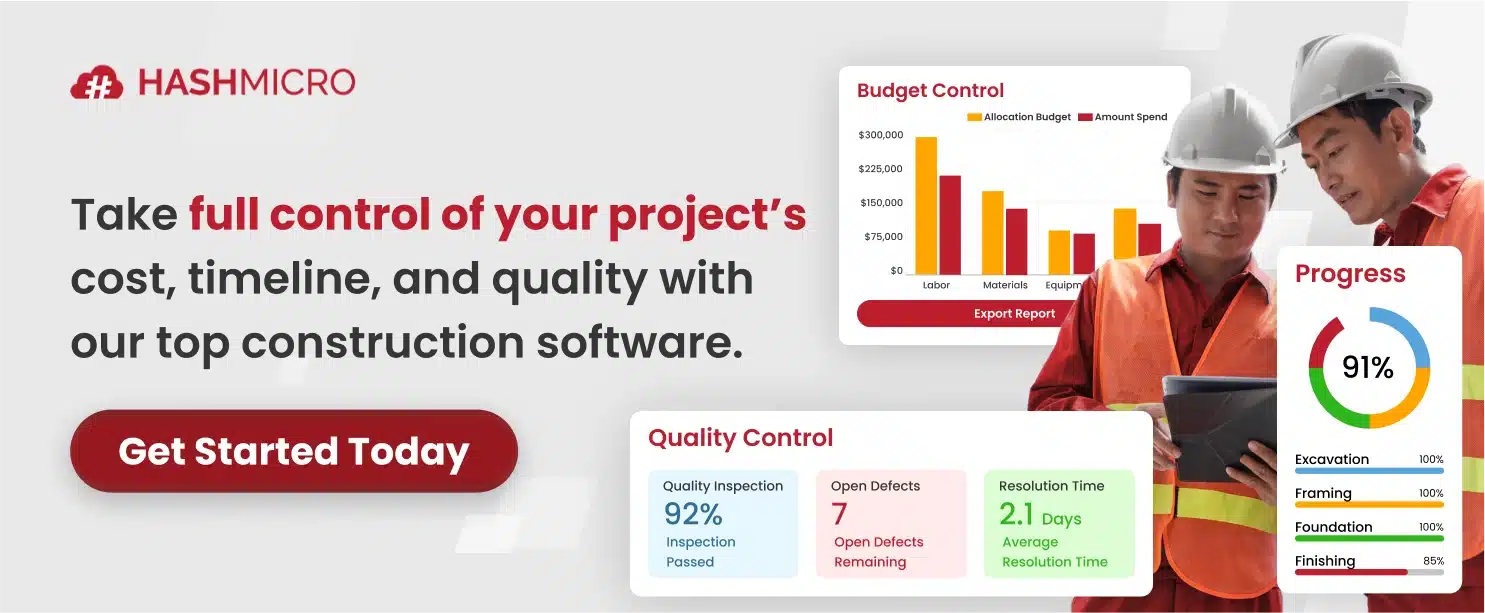
FAQ about Construction Management Software
-
Which ERP is best for a construction company?
The 20 Best Construction ERP Software to Use in 2025
1. HashMicro Construction Software
2. Acculynx ERP Construction Singapore
3. ClickUp Construction Project Management Software
4. Asana Project Management Construction Software
5. OrangeScrum Project Management System
6. Clockify
7. Wrike Construction Management Software
8. Zoho Project Management Software
9. Procore Construction Software
10. CoConstruct Management Construction Software
11. Bluebeam Construction Management System
12. Fieldwire Construction Software
13. Clear Estimates
14. ProContractor
15. Projectmates
16. TeamGantt
17. Fluix Building Construction Software
18. Methvin
19. PlanGrid
20. JobProgress Construction Software -
What is construction project software?
Construction project management software manages the planning, scheduling, construction, resource allocation, and reporting of construction projects. It optimizes workflows and boosts productivity, ensuring tight schedules and budget adherence.
-
How to choose construction management software?
Key Factors in Selecting Construction Project Management Software
1. Project Complexity and Scope.
2. User-Friendly Interface.
3. Collaboration and Communication Capabilities.
4. Compatibility with Other Tools.
5. Cost and Budget.
6. Customer Support and Training. -
Who uses construction software?
Construction management software is used by project managers, construction teams, design teams, architects, engineers, subcontractors, and owners. Each stakeholder uses the software for various purposes, with many overlapping functions.
-
What is build management in software?
Build management involves gathering all assets for a software release, executing automated tasks to compile, build, and test the system, and deploying it to development and testing environments in preparation for staging.




